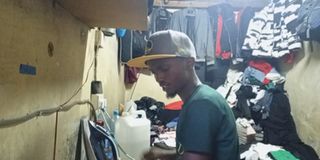Meet Nakuru's Mitumba Iron Man

Kelvin Muhinye began ironing wrinkled second-hand clothes in 2019 in Nakuru.
Kelvin Muhinye's right arm moves in a well-orchestrated rhythm as he moves an iron box back and forth with a precision that seems synchronised to an inner beat.
Around him are piles of clothes, neatly arranged on benches and tables, ready for his customers to pick up.
Over the past four years, he has made a name for himself as the go-to guy for second-hand clothing dealers.
His job, to iron wrinkled second-hand clothes to help make them look presentable. He and his friend identified a unique market need for second-hand clothes that often needed ironing to make them more attractive to customers interested in making a purchase.
"When a bale of second-hand clothes is opened, the clothes are usually wrinkled and unattractive. But once ironed, their appearance improves dramatically," says Kelvin.
With the business idea in mind, they immediately secured a workspace and purchased electric ironing boxes. Thanks to existing relationships with second-hand clothing sellers, attracting clients was not a challenge.
The business, he says, has proved to be sustainable as the work has allowed him to support himself and his family comfortably.
On a busy day, he can iron over 100 pieces of clothing, charging between Sh20 and Sh100 per item.

Dan Kamau displays ironed second-hand clothes in his shop in Nakuru.
Dan Kamau, a second-hand clothes seller, testifies to the benefits of Kelvin's service.
"Nguo ikipaswa inakua camera kabisaa kushinda kama haijapaswa na nguo camera iko na bei," says Dan.

Dan Kamau is a second-hand clothes trader in Nakuru.
Lucy Waceke, who sells second-hand scarves, echoes Kamau's sentiments, noting that she makes sure her scarves are ironed before displaying them in her shop.
The ironing, however, affects the overall selling price of the second-hand clothes as traders usually factor in the amount spent on ironing.

Lucy Waceke sells scarves in Nakuru town.
"The added value of ironed garments makes a noticeable difference in customer perception and sales. That is why all second-hand garments have to undergo this process," Lucy says.

